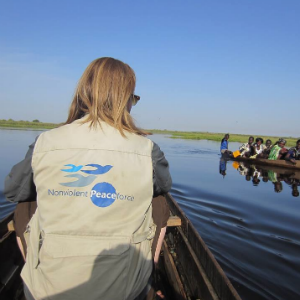
Sheldon Wardwell has been a Protection Officer with Nonviolent Peaceforce in South Sudan since December 2013. We asked him to share his perspectives with us. He wrote the following on his phone, under a tree in the UN base in Bentiu, South Sudan.
The situation here in South Sudan is very complicated and seldom understood. At the moment, we have tens of thousands of internally displaced persons (IDP) living in a UN base in Bentiu for fear of their lives. Despite everyone’s efforts (NGOs and the UN), the conditions at the base (distinguished as a Protection of Civilians site) are unlivable. The camp has been entirely flooded, and people are suffering and dying at extremely high rates. Let me give you a little more background:
I arrived in South Sudan on December 11 last year for my new job as a Protection Officer with Nonviolent Peaceforce. Four days later, a terrible civil war began.
Without placing blame on any particular side of the conflict, I can say that armed actors and innocent civilians alike have been the targets and victims of unimaginable violence, murder and rape. Whole communities and cities have been destroyed and hundreds of thousands of people displaced. I have personally witnessed the destruction and looting of whole communities, including the twin-towns of Bentiu and Rubkona, where I currently live. I have driven down roads in this area lined with the dead bodies of civilians and soldiers on more than a couple occasions.
Even more heartbreaking, from my own experience, has been the numerous times I accompanied mothers to bury their small children outside the base due to preventable diseases.
When violence consumes communities, options for immediate survival are limited: flee to the bush, to a nearby country, or to a UN base. However, the medium-term challenges to conflict and displacement, namely disease and food insecurity, are often the biggest killers in South Sudan. Since January, I have worked in the UN base in Bentiu, Unity State, an area that has experienced some of the fiercest fighting of the war and currently hosts the largest IDP population of any UN base in the country. Here, together with a handful of other NGOs – providing various services from protection (like my NGO) to food, water, health and sanitation – we have tried to support the settlement of around 40,000 IDPs. To try to paint a clearer picture of what this entails, imagine building a city overnight in a low-lying swampy area, with very little equipment, in one of the most remote and logistically challenging regions in the world, while an active war outside threatens the security of civilians and international staff.
The settlement here in UNMISS Bentiu has completely flooded in recent weeks as the rainy season has set in. Tens of thousands of helpless civilians, primarily women and children, are currently stuck here living in flooded shelters exposed to water and open sewage. For fear of their lives, these people cannot move to areas with better conditions.
My experience since December has been disheartening, but today’s conditions in Bentiu truly bring on a new low. There is grave concern about the lack of progress made at the peace talks in Addis last week, and we have since experienced serious fighting in the area. Just last Friday, Bentiu was the scene of a terrible battle with hundreds of casualties. On Monday morning during our team meeting under “the tukul”, we had to hit the ground and then make for a bunker as bullets whizzed into the base striking nearby containers. I’m never sure anymore what tomorrow will bring.
As I see it, the only thing that can fix the situation is an immediate political solution at the national level, followed by several years of local and regional peace and reconciliation processes and development. Without this, I fear the kind of suffering and violence we are now witnessing will continue for years.
To learn more about Nonviolent Peaceforce, please visit their website – www.nonviolentpeaceforce.org – and follow them on Twitter – @Peaceforce